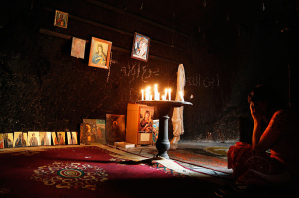
Until recently, the coverage of persecution directed at Christians and other minorities have received scant attention from most Western media outlets. However, one prominent news magazine in the United States has placed the issue on the front page.
According to a detailed article written by Janine Di Giovanni and Conor Gaffey of Newsweek, ISIS has mainly focused its constant attacks on Christians, referring to them as "crusaders" the terror group is fighting against in the name of Islam. This systemic persecution, which was also carried out by Syrian al-Qaida franchise Jabhat al-Nusra, has steadily reduced the populations of Christians in the Middle East from 20 percent in the beginning of the 20th century to the current total of around 5 percent.
"I saw people wearing al-Nusra headbands who started shooting at crosses," 62-year-old Adnan Nasrallah said. "[One of them] put a pistol to the head of my neighbor and forced him to convert to Islam by obliging him to repeat, 'There is no God but God.' Afterwards they joked, 'He's one of ours now.'"
According to Newsweek, the incident Nasrallah described took place in the Syrian town of Maaloula. Jihadis first overran this mountain town in 2013, and the Syrian army, with help from Iran-back Hezbollah militia, retook the area three times, first from Syrian rebels and later by al-Nusra militants.
"Maaloula means entrance in Aramaic," Giovanni and Gaffney wrote. "For centuries, Christians and Muslims have come here to pray for miracles, but the residents of Maaloula weren't blind to the dangers that swirled around them."
Giovanni and Gaffey reported that churches were burned down and Christian residents were driven out every time Syrian rebels or al-Nusra militants occupied Maaloula. Although the town is mostly in control by the Syrian army, only 150 Christian families remained; the rest fled to other places, many of them in Beirut, Lebanon.
"Many houses have been gutted by fires, and the churches and monasteries are damaged from the fighting," Giovanni and Gaffey wrote.
The Center for American Progress released a report this month that focused on the plight of Christians in the Middle East. Although there are 2 billion Christians worldwide, only less than 1 percent of them live in that region and their numbers could shrink even faster according to Newsweek.
"Some of the oldest Christian communities in the world are disappearing in the very lands where their faith was born and first took root," the Center for American Progress wrote. "Christians have migrated from the region in increasing numbers, which is part of a longer-term exodus related to violence, persecution, and lack of economic opportunities stretching back decades."
Newsweek reported that up to as many as 4 million Syrian refugees of all religious backgrounds have fled to Egypt, Jordan, Lebanon, Turkey and Iraq. The Christian population in Syria was estimated to be around 1.1 million back in 2011; a European Parliament resolution indicated that 700,000 Syrian Christians fled the region.
"The plight of Christians in the Middle East varies greatly from country to country, but the news is mostly bad," Giovanni and Gaffey wrote. "In Lebanon, for example, Christians make up around 38 percent of the population and play a powerful role in politics (though many fled during the 1975-1990 civil war). In Jordan, there are not many Christians, but they are guaranteed some seats in Parliament and generally live in safety, and the country has become a relatively safe haven for Christian refugees."
Newsweek reported that Christians in Israel and the Palestinian territories are generally left alone, although "they endure the same hardships as their neighbors." However, Egypt's 4 million Christians, many of them Coptic, have been targets of "institutionalized discrimination."
Despite persecution faced by most Christians in the Middle East, Assyrian Christian William Warda has tried to convince fellow Christians to stay in their homelands and endure the hardships.
"I tell them that they must stay or we will not have a Christian population," Warda said. "I go to northern Iraq, and I tell people to stay in their villages, not to run away, to resist. I tell them to be patient. I try to reassure them it is a temporary crisis, and it will pass."
If Christians fail to stay in the Middle East, the Center for American Progress elaborated on what type of society could emerge from that region.
"If one of the most important religious groups in the world continues to be forced out of the Middle East, this bodes negatively for pluralism, tolerance and the ability of the region's people to live interlinked with the rest of the world," the organization wrote.






